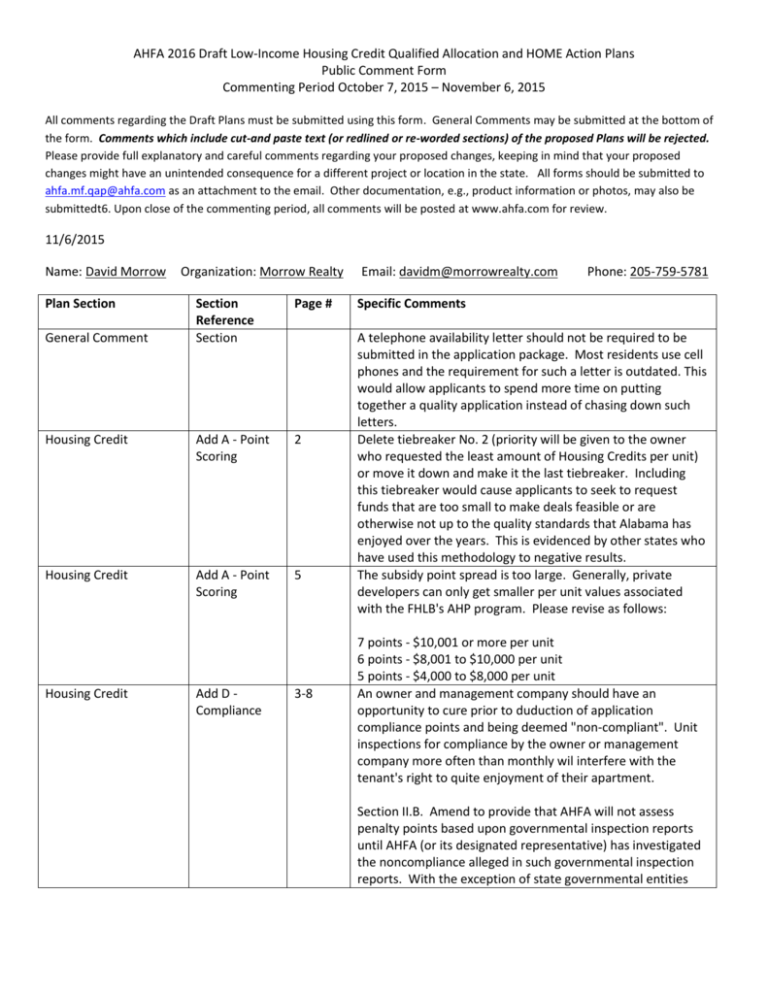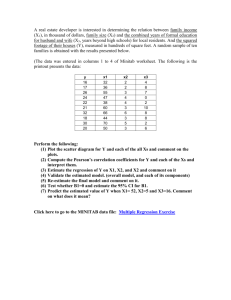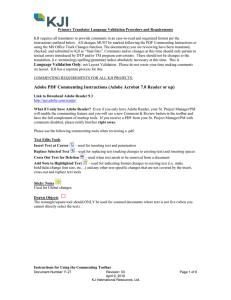David Morrow, Morrow Realty, 11/06/15
advertisement

AHFA 2016 Draft Low-Income Housing Credit Qualified Allocation and HOME Action Plans Public Comment Form Commenting Period October 7, 2015 – November 6, 2015 All comments regarding the Draft Plans must be submitted using this form. General Comments may be submitted at the bottom of the form. Comments which include cut-and paste text (or redlined or re-worded sections) of the proposed Plans will be rejected. Please provide full explanatory and careful comments regarding your proposed changes, keeping in mind that your proposed changes might have an unintended consequence for a different project or location in the state. All forms should be submitted to ahfa.mf.qap@ahfa.com as an attachment to the email. Other documentation, e.g., product information or photos, may also be submittedt6. Upon close of the commenting period, all comments will be posted at www.ahfa.com for review. 11/6/2015 Name: David Morrow Plan Section Organization: Morrow Realty Section Reference Section Page # Housing Credit Add A - Point Scoring 2 Housing Credit Add A - Point Scoring 5 General Comment Housing Credit Add D Compliance 3-8 Email: davidm@morrowrealty.com Phone: 205-759-5781 Specific Comments A telephone availability letter should not be required to be submitted in the application package. Most residents use cell phones and the requirement for such a letter is outdated. This would allow applicants to spend more time on putting together a quality application instead of chasing down such letters. Delete tiebreaker No. 2 (priority will be given to the owner who requested the least amount of Housing Credits per unit) or move it down and make it the last tiebreaker. Including this tiebreaker would cause applicants to seek to request funds that are too small to make deals feasible or are otherwise not up to the quality standards that Alabama has enjoyed over the years. This is evidenced by other states who have used this methodology to negative results. The subsidy point spread is too large. Generally, private developers can only get smaller per unit values associated with the FHLB's AHP program. Please revise as follows: 7 points - $10,001 or more per unit 6 points - $8,001 to $10,000 per unit 5 points - $4,000 to $8,000 per unit An owner and management company should have an opportunity to cure prior to duduction of application compliance points and being deemed "non-compliant". Unit inspections for compliance by the owner or management company more often than monthly wil interfere with the tenant's right to quite enjoyment of their apartment. Section II.B. Amend to provide that AHFA will not assess penalty points based upon governmental inspection reports until AHFA (or its designated representative) has investigated the noncompliance alleged in such governmental inspection reports. With the exception of state governmental entities AHFA 2016 Draft Low-Income Housing Credit Qualified Allocation and HOME Action Plans Public Comment Form Commenting Period October 7, 2015 – November 6, 2015 General Comment Section Plan Plan Plan Plan Plan Plan Plan Plan Plan Plan Plan Plan Plan Plan Plan Plan Plan Plan Plan Plan Plan Plan Plan Plan Plan Section Section Section Section Section Section Section Section Section Section Section Section Section Section Section Section Section Section Section Section Section Section Section Section Section which regularly audit compliance with Section 42 of the Code, a report from an outside party many not necessarily be a reliable indication of compliance or noncompliance. Any and all construction or rehabilitation underwriting cost guidelines, particularly construction costs, should be disclosed in written form if there are any thresholds or limits that Developers need to fall within. Currently there is a cost reasonableness test for eligibility and/or allowable credits or HOME funds, but no one knows what it is. Developers need to make informed decisions with regards to spending a large sums of predevelopment costs if they do not know they will qualify or have sufficient resources. There should also not be a one size fits all cost guidelines as some costs are higher if located in certain areas of the state that have to meet more stringent construction standards for hurricanes for instance. Additionally, tax exempt bond rehabs may be structured differently in financing and timing of construction costs spread out over time so it would not be apples to apples in comparing the construction costs up front or the scope of work done up front to stand alone 9% rehab projects. AHFA 2016 Draft Low-Income Housing Credit Qualified Allocation and HOME Action Plans Public Comment Form Commenting Period October 7, 2015 – November 6, 2015 Plan Section






